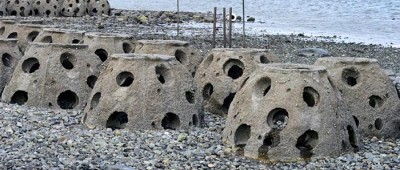
The Connecticut Institute for Resilience and Climate Adaptation (CIRCA) provided a $91,000 grant to Professor Jennifer Mattei at Sacred Heart University to fund the purchase of most of the 273 reef balls needed to protect an additional 750 feet of shoreline at Stratford Point in Stratford, CT. The CIRCA grant represents a 25% match for grants for the project from the Audubon Connecticut, Connecticut In-lieu-fee program of $250,000 and the National Fish and Wildlife Foundation, Long Island Sound Futures Fund of $115,199.
With this award, CIRCA supports the implementation and evaluation of the effectiveness of artificial reefs as a living shoreline approach to reduce shoreline erosion and provide for the restoration of a marsh and dune behind the reef. This project will serve as a model to advance the design and use of living shorelines in coastal municipalities across the state and northeast region as they prepare for the impacts of climate change, storms and a rising sea. Improving the science, design and policies around the living shorelines resilience strategy has been a top priority for the Institute since its inception. CIRCA supports an online web viewer with site suitability analysis, wave heights and design criteria for living shorelines and co-sponsored the first national conference on living shorelines in Hartford, Connecticut in 2015.
Living shorelines can be an excellent alternative to hard structures at the coast for a shoreline erosion control approach for a variety of reasons. Importantly, hard structures (e.g. bulkheads, revetments, seawalls, etc.) are often damaging to a coastline. These types of structures can increase erosion at the shore, inhibit natural coastal processes, and destroy natural habitat for fish, animals, and plants. Where hard structures ‘fail,’ living shorelines succeed. Living shorelines mimic natural settings and have many positive co-benefits to erosion control, including but not limited to: habitat creation, water quality enhancement, and maintaining natural coastal processes.
CIRCA is a partnership between the University of Connecticut and the Connecticut Department of Energy and Environmental Protection. Its mission is to increase the resilience and sustainability of vulnerable communities along Connecticut’s coast and inland waterways to the growing impacts of climate change on the natural, built and human environment. Funding for the grant to Dr. Mattei was provided through the Institute’s Matching Funds Program, a competitive grant program, which leverages funds from CIRCA to help Connecticut’s stakeholders in resilience and climate adaptation compete for grants from federal agencies and private foundations that will advance the mission of the Institute. Projects are selected by the Institute’s Executive Steering Committee, which is made up of members from both the University of Connecticut and the Connecticut Department of Energy and Environmental Protection. More information can be found at circa.uconn.edu.
Read more about the project here: